Did you know that even though you're healthy and active, you may still have nutritional gaps in your diet that can be holding you back? Your physical, mental and emotional state relies on a wide range of nutrients.
Australian nutrition guidelines recommend at least five servings of vegetables and two serves of fruit per day. Most Australians are falling short - did you know only 5% of Aussie adults meet the required amounts? This is where supplements like multivitamins can save the day!
Even as an athlete, you may not be hitting the necessary micronutrient amounts you need daily to perform at your best.
Why you may want to use a multivitamin:
- You're looking for an easy way to fill nutritional gaps
- You are an athlete or active person with additional nutrient needs
- You're looking for a convenient way to boost your healthy diet
- You are vegan or vegetarian
- You are an adult over 60 years of age
Are multivitamins safe?
Multivitamins are considered safe when you use them as directed and follow recommended daily intakes. Side effects from multivitamins are rare; some people may experience gut issues as they get used to the formula. Always consult your medical practitioner before starting a new supplement regime.
Is it good to take a multivitamin every day?
Multivitamins are designed to be used daily with your healthy diet and active lifestyle. Remember that no pill or potion can substitute for an all-around healthy diet - it's meant to be the icing on the cake!
Why are multivitamins good for you? Your body functions best when you have adequate nutritional intake, which isn't always possible in our stressful daily lives. Over time, low-grade inflammation can leave you susceptible to illness. If you're training hard, did you know that you have even higher nutritional requirements than the average person.
When you supply your body with the right amount of nutrition, you will feel better protected in health, and you'll feel energised, vibrant and ready to smash your fitness goals.
Will a multivitamin give you energy?
If your nutritional status is low, having a multivitamin will give you the necessary B-Vitamins for energy production and make you feel incredible from the inside out. Do multivitamins cause insomnia? No, they won't unless you're overloading on B-vitamins.
Why are multivitamins more valuable today?
- Busy lifestyles that make eating a wide variety of healthy foods more difficult
- The degradation of farming soil, meaning lower nutrients present in most foods
- An overabundance of highly processed (and palatable) foods
- Increased instances of gastrointestinal issues
- The general population living longer, thus being more susceptible to illness
- Stress and anxiety
Multivitamins and you as an athlete:
If you're training hard (and we know you are!), your body requires a higher amount of vitamins and minerals due to:
- Minerals lost in urine and sweat
- Increased energy demands during training
- Increased recovery needs post-workout
Plus, if you're trying to lose body fat and eating at a deficit, your micronutrient status is even more important simply due to the low food volume.
Multivitamin by Athletic Sport
The multivitamin formula by Athletic Sport is designed with your active lifestyle in mind. Created in both a men's and women's version, you'll find exactly what you need to maintain your energy and vitality during your busy day.
In each serving of two capsules, you'll find:
- A wide range of vitamins, including B vitamins, vitamins A, C, D, E, K
- Essential minerals like Magnesium, Calcium, Copper, Manganese, Potassium, Sodium, Silica and Zinc
- A unique superfood blend
Carefully crafted to contain the dosages needed to maintain a healthy lifestyle, you'll have what you need to give your body exactly what it needs. Remember to pair your Multivitamin with your other Athletic Sport supplements for best results!
References:
Australian Dietary Guidelines (Eat for Health) - https://www.eatforhealth.gov.au/guidelines
Clarkson P. M. and Haymes E. M. Trace mineral requirements for athletes. Int J Sport Nutr. 1994 Jun;4(2):104-19.
Dam BV. Vitamins and sport. British Journal of Sports Medicine 1978;12:74-79.
Huang HY, Caballero B, Chang S, et al. Multivitamin/mineral supplements and prevention of chronic disease. Evidence Report/technology Assessment. 2006 May(139):1-117. PMID: 17764205.
Radimer KL. National nutrition data: contributions and challenges to monitoring dietary supplement use in women. J Nutr 2003;133(suppl):2003S–7S.
Qun Xu, Christine G Parks, Lisa A DeRoo, Richard M Cawthon, Dale P Sandler, Honglei Chen, Multivitamin use and telomere length in women, The American Journal of Clinical Nutrition, Volume 89, Issue 6, June 2009, Pages 1857–1863, https://doi.org/10.3945/ajcn.2008.26986






